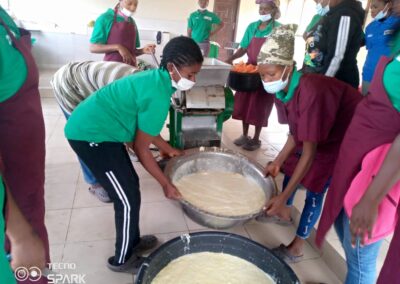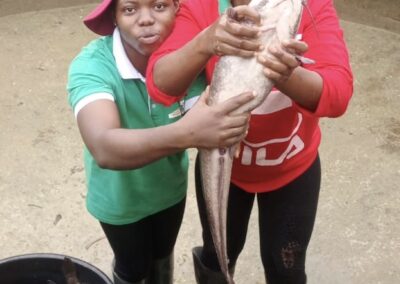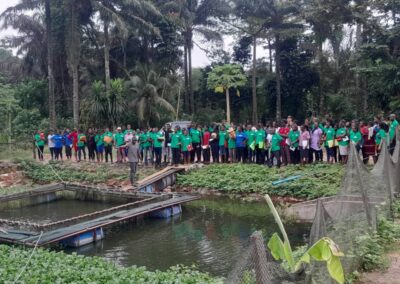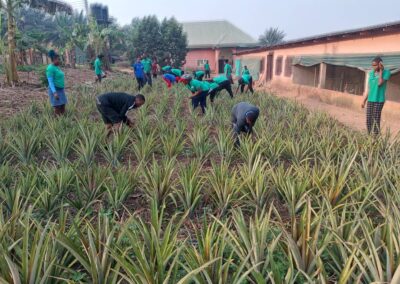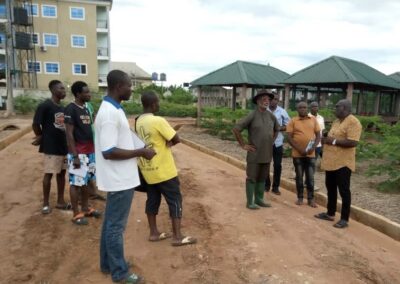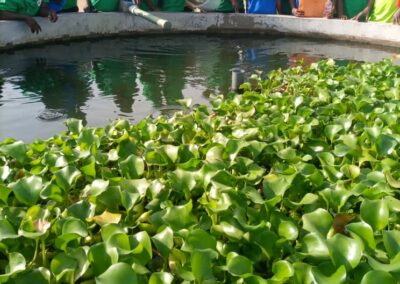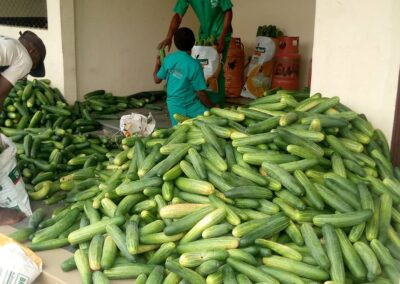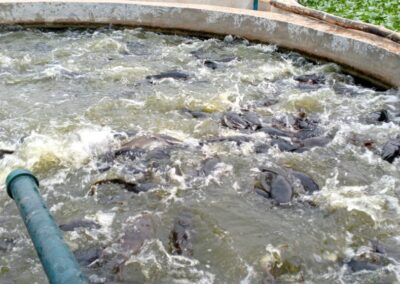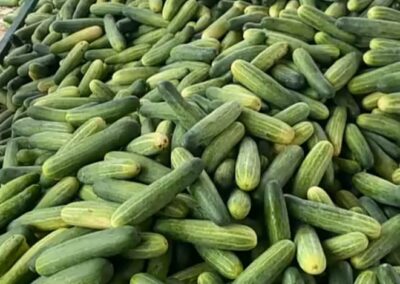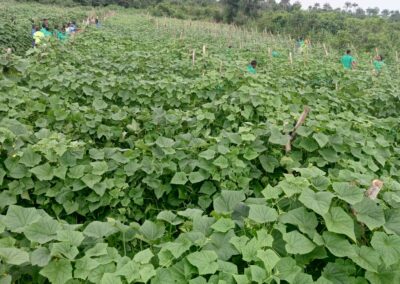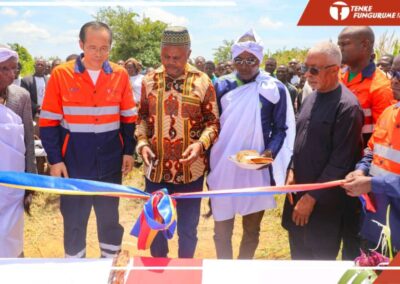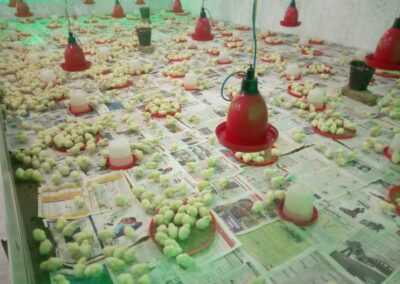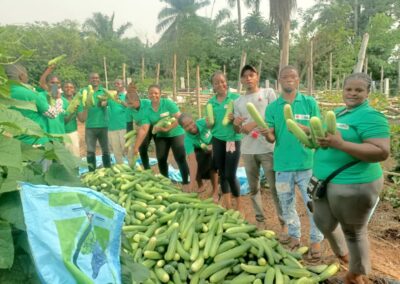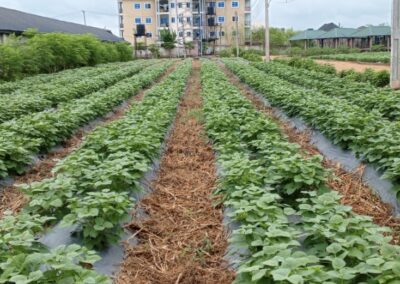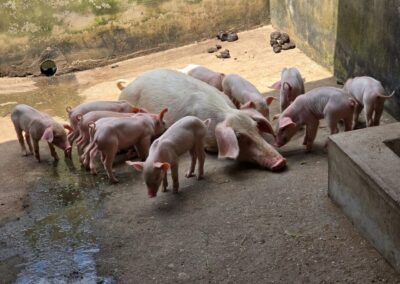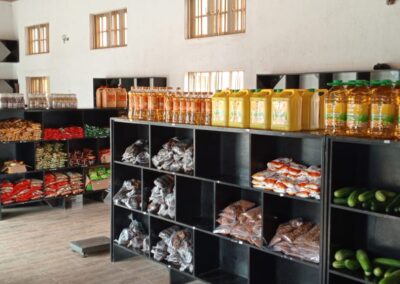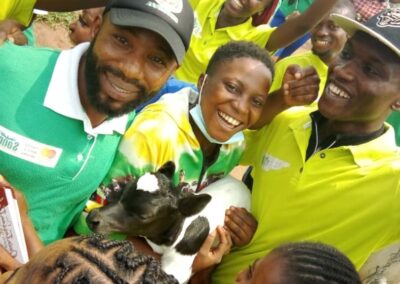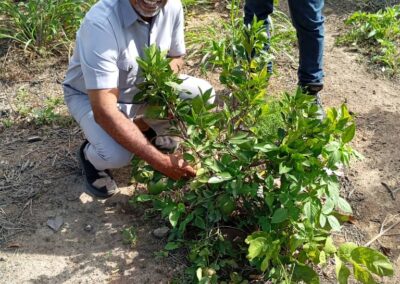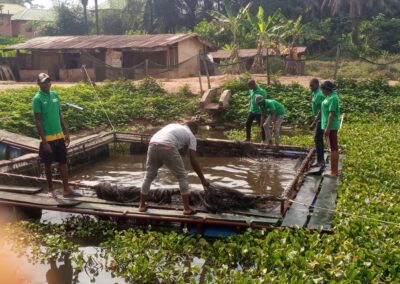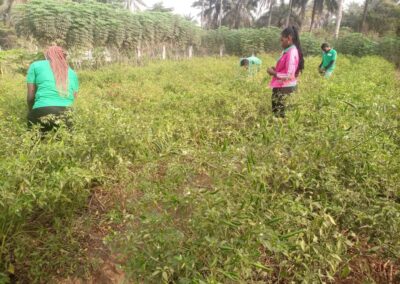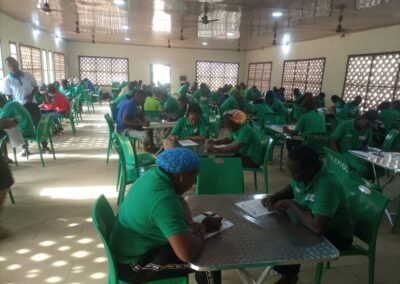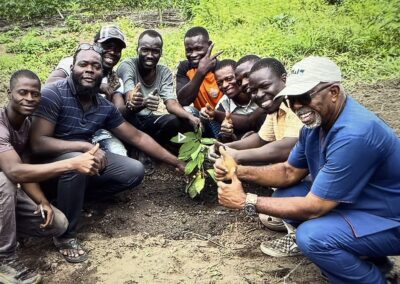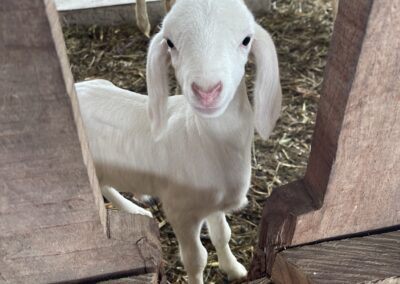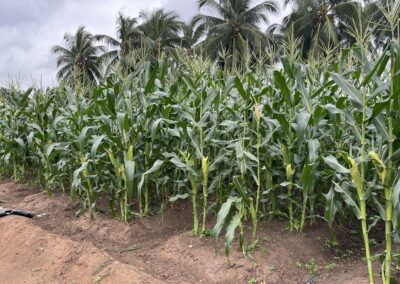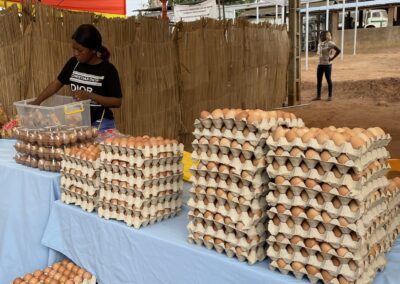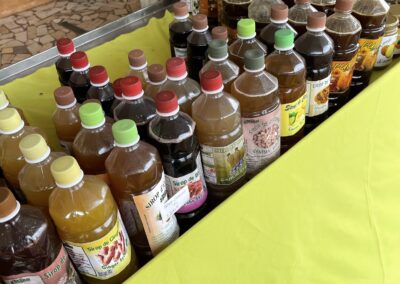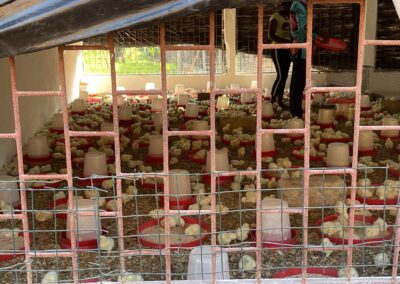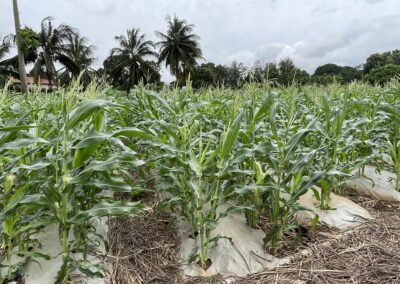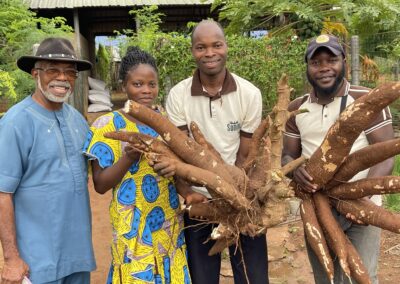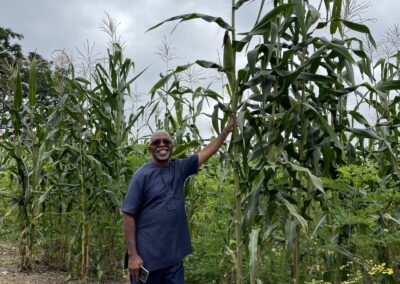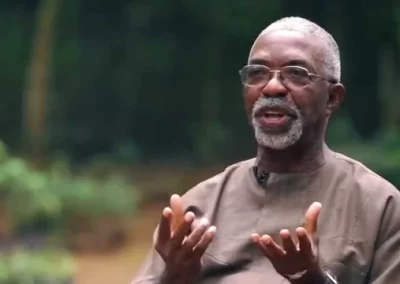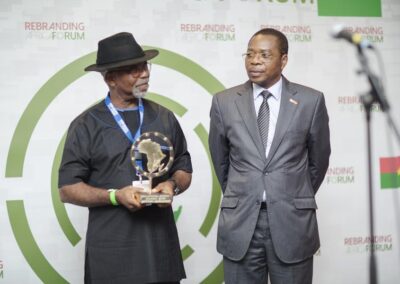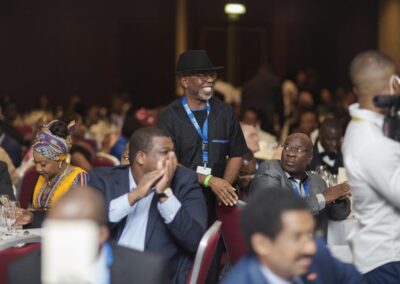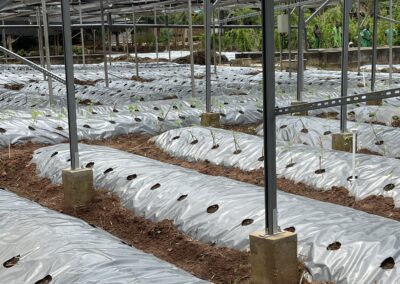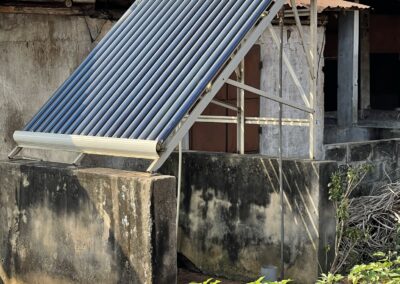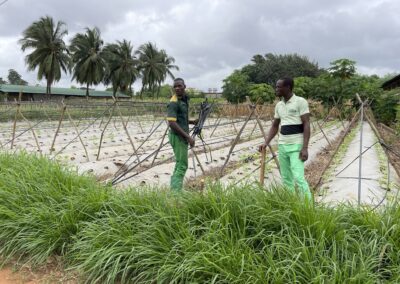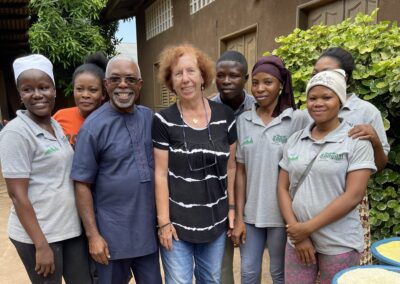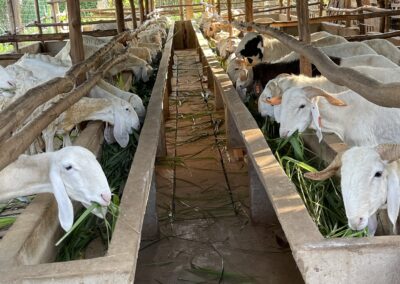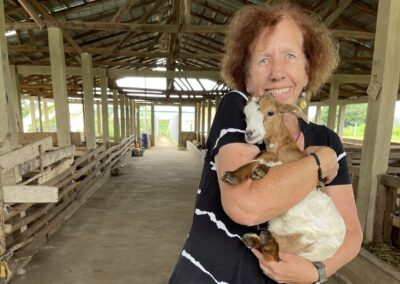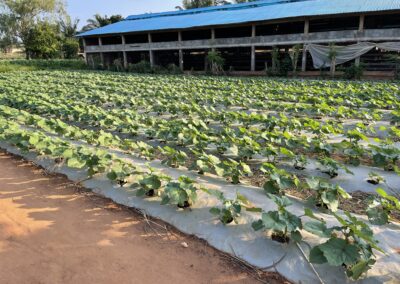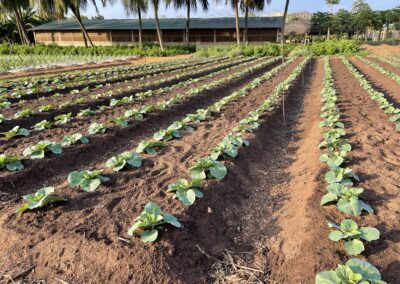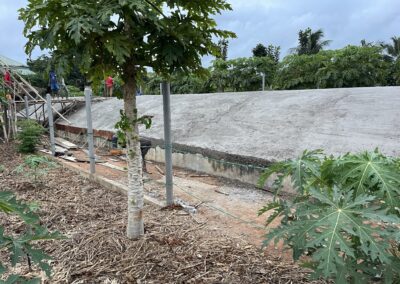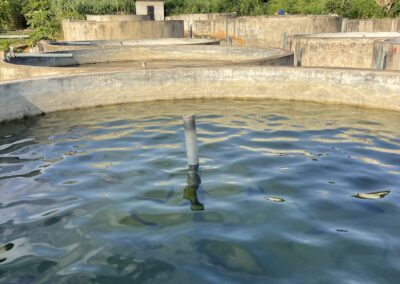NEWSLETTER
A PROGRESS REPORT TO OUR FRIENDSSonghai Newsletter- May 4, 2025
From the office of the President,
Songhai International
California, USA
Ms. Susan Mattern
🌱 SONGHAI PROGRESS REPORT
Reimagining Agriculture, Leadership, and Sustainability in Africa
Newsletter Edition – April 2025
What Is Songhai?
Songhai is a non-profit 501 c) (3) corporation registered in the United States and the State of California for the purpose of supporting the activities and training at Songhai in Africa.
We have just set up online donations at Zeffy which will go directly into the Songhai account to be used for education, training of students, solar equipment, and a microbiology lab. The details are below.
Donate to Songhai to make a difference
The Songhai Program is more than an agricultural project—it is a regenerative, systems-based transformation platform. Born out of the urgency to rethink Africa’s development trajectory, Songhai is a holistic, integrated agro-ecological initiative that builds sustainable food systems while training a new generation of African leaders to spearhead green entrepreneurship and socio-economic regeneration.
We understand that Africa’s transformation cannot be reduced to agricultural productivity alone. It requires the construction of resilient, self-sustaining ecosystems—economically viable, socially inclusive, and ecologically sound.
What Makes Songhai Unique?
At the heart of the Songhai model lies a dual foundation that integrates capital-based development with institutional innovation.
🔷 The Five Capitals Operational Base
Our framework organizes our work around five interdependent forms of capital:
- Environmental Capital: Restoring and regenerating ecosystems.
- Human Capital: Building technical, moral, and leadership competencies.
- Social Capital: Cultivating trust, civic responsibility, and cooperation.
- Economic Capital: Creating value and wealth through productive activities.
- Technological Capital: Applying appropriate innovations to power sustainability.
🔷 The Five-Part Institutional Framework
This architecture ensures that innovation is embedded in every layer of our operations:
- Ecological Worldview & Eco-literacy: Nurturing a paradigm rooted in nature’s intelligence.
- Technology Park: Developing regenerative tools and green technologies.
- Production Park: Deploying these innovations into functioning agro-production systems.
- Incubation Park: Turning knowledge into enterprise and grooming entrepreneurs.
- Service Space: Offering long-term mentoring, peer networks, and market linkages.
What We Do Differently: Songhai’s Agricultural System
Our agricultural practices are not just sustainable—they are regenerative and deeply integrative.
🌿 Key Features Include:
- Circular Synergies: Crop production, animal husbandry, and aquaculture are interlinked to create closed-loop systems.
- Zero-Waste Philosophy: Outputs from one process become inputs for another—nothing is wasted.
- Agroecological Zoning & Polyculture: Designed to foster biodiversity and system resilience.
- Soil Regeneration: We restore degraded land using compost, green manure, and microbial ecosystems.
- Clean Energy Integration: Solar, biogas, and fuel-efficient technologies reduce carbon footprints.
- CSEM Technologies (Carbon-Silicon-Electro-Mechanical): These next-gen systems optimize energy, material, and labor efficiency while addressing core systemic inefficiencies.
From Vision to Impact: Highlights from the Field
Delivering Songhai has been a journey of complexity and transformation. Each Songhai center is a live laboratory—a hub of innovation where sustainable solutions are tested, refined, and scaled.
🌟 Success Stories
- Graduate-led cooperatives have regenerated degraded land into vibrant agribusiness clusters.
- Youth-led green enterprises now design and deploy solar irrigation systems and smart greenhouses.
- Women-led ventures use digital tools to expand markets, streamline logistics, and reduce food waste.
Tackling Real-World Challenges
While the impact is visible, the journey has not been without difficulties:
- Startup financing remains a major hurdle for young entrepreneurs.
- Community resistance to new ideas slows initial adoption in some areas.
- Infrastructure gaps, such as power and internet instability, limit scalability.
- Policy inertia delays the alignment of national development strategies with agroecological and renewable energy models.
Despite these obstacles, Songhai alumni and communities are building momentum and resilience, embodying what it means to be architects of their own future.
Our Innovations: Technology and Indigenous Wisdom Working Together
Songhai is where biotechnology, digital intelligence, renewable energy, and eco-literacy converge with local ingenuity.
Some of our flagship innovations include:
- Biogas Units: Convert organic waste into energy and compost.
- Hydroponics & Aquaponics: Enable soil-free, water-efficient food production.
- Effective Microorganisms & Vermiculture: Restore soil health naturally.
- TechParc Incubators: Nurture AI, solar, and data-driven agri-solutions.
- Climate-Resilient Crops: Developed using microbiome science and ecological breeding.
- AI-Driven Platforms: Improve decision-making, marketing, logistics, and training in real time.
Together, these innovations form the base of a climate-smart, circular, low-carbon food system.
What We’ve Achieved So Far
🎯 Core Objectives
- Transition toward Carbon-Silicon-Electro-Mechanical-based agricultural systems.
- Empower youth with skills, values, and entrepreneurial capacity.
- Create resilient agro-ecological zones and circular economies.
- Restore land and ecosystems using green regenerative practices.
- Build a self-propelling ecosystem of job and wealth creation.
🏆 Key Milestones
- 3,800+ youth trained across Southern Nigeria and beyond.
- Multiple agro-ecological zones established as enterprise hubs.
- Expansion of the TechParc, now hosting renewable energy and agri-tech pilots.
- Recognition as a living model for Africa’s regenerative Green Economy.
Impact on Individuals and Communities
👩🏾🌾 For Participants
- Gained technical mastery in green agriculture and renewable systems.
- Developed strong entrepreneurial and leadership capacities.
- Shifted mindsets—from survival to innovation; from fragmentation to integration.
- Became part of a lifelong ecosystem of mentors, peers, and opportunities.
🏘️ For Communities
- Boosted local food production and food security.
- Created inclusive jobs, especially for women and youth.
- Sparked economic activity through agro-industrial and service-based value chains.
- Strengthened social cohesion via collaborative, trust-based networks.
- Raised environmental awareness and adoption of regenerative land practices.
Communities are no longer passive recipients of aid—they are now co-creators of a resilient, dignified future.
How We’re Responding to Broader Agricultural Sector Challenges
Sector-wide Pain Points:
- Widespread soil degradation and ecosystem collapse.
- Youth alienation from agriculture.
- Disconnected and underperforming value chains.
- Increasing climate volatility and resource scarcity.
- Policy and governance gaps inhibiting effective, agile solutions.
Our Integrated Songhai Responses:
- Regenerative agriculture as an ecological and economic imperative.
- Youth-centered, innovation-based training models.
- Agro-industrial clusters supported by smart infrastructure.
- Biotech and clean energy to drive circularity and productivity.
- Smart governance tools, including digital monitoring and decentralized management systems.
Looking Ahead
We are not just transforming land—we are transforming lives, communities, and the African development narrative. Through the Songhai model, we are proving that Africa can regenerate itself from within—by drawing on its people, its ecosystems, and its ingenuity.
As we deepen our work, we invite partners, governments, communities, and visionaries to join us. Together, let’s shape a future where agriculture is not just a means of survival, but a platform for dignity, prosperity, and planetary harmony.
Songhai: More than a farm. A movement. A prototype for Africa’s regenerative renaissance.
Susan Mattern
President, Songhai International,
California, USA
Songhai Newsletter- December 10, 2024
Dear friends of Songhai,
I was finally able to speak to a person at the IRS yesterday, and they said we could accept donations as a 501c3 charitable organization for the year 2024. We’ve been waiting almost six months for this exciting news! I wanted to let you know as soon as possible in case you wanted to make a donation for this year.
Father Nzamujo is working hard on his solar projects in northern Benin and Nigeria. They’ve helped water the fields and have enabled the projects to produce multiple harvests a year instead of just one during the rainy season.
He has also installed cold storage units to preserve the food to send all over Africa.
Next year, 2025, will be the 40th anniversary of Songhai, and time to highlight and celebrate its incredible success in transforming Africa’s agriculture and land restoration, as well as jobs for the youth.
Money is always needed for the ongoing training of students from all over Africa, for their six-month education program, plus housing and living expenses.
Since we just found out today about the donation status, we don’t yet have a donation account where you can send money online. But you can send a check made out to
“Songhai”
c/o Susan Mattern – President-Songhai
4 Shepherd Ct.
Ladera Ranch, Ca. 92694
I know that whatever you can give will be put to good use- I’ve seen the incredible work that’s been done there not only by Nzamujo, but by hundreds of people at the Songhai sites in Benin.
I’ve been privileged to visit Songhai three times and I’ll be returning again this summer. I wish you could experience the sense of joy and accomplishment- and hope in their community. They’re all aware of the importance of what they’re doing- whether its growing crops, aquaculture, solar energy, computer science, or learning how the soil can not only produce more but be restored in the process. Each person is aware of the important part they play.
Nzamujo has also made sure that women comprise 70% of the students being trained- they will be an important part of the future of Africa.
I’m looking forward to seeing the progress made in just one year, as I’ve seen every year I’ve visited. I hope you’ll join in helping us.
Songhai may be far away in miles, but as we’ve learned from the pandemic and climate change, we’re more interconnected than we ever thought, and we need to rely on everyone in the world to do their part in taking care of our earth- and each other!
Thank you,
Susan
Songhai Newsletter- June 1, 2024
Songhai is an organization headquartered in Porto-Novo, Republic of Benin, that promotes sustainable development as a viable option to fight poverty in Africa. It sees itself as a laboratory of African renaissance. Songhai was founded by Fr. Godfrey Nzamujo in 1984, his vision over the past thirty years has centered on sustainable, regenerative/ organic agriculture that produces more and better with less as foundational in rebuilding Africa. The people at Songhai are not only self-sufficient to ensure food security in their communities, but their socio-economic activities have positive effects on their neighboring communities. “Waste to wealth” is the driving philosophy of the Songhai movement.
Songhai is a zero- waste project. Everything is recycled. It produces its own energy and grows crops that are fertilized by the recycled waste products of animals and plants. At every level, byproducts from one area are used in another. Crop waste is used to feed the animals and their waste is turned into biogas; a natural fuel that powers the farm.
Songhai sells food and vegetables at markets around the country to generate income. They produce bananas, mushrooms, pigs, fish, chickens, ducks, varieties of beans, maize, cashew nuts, and rice. They make their own machines at the foundry, bottle drinking water, and grow fish for people.
He wants to transform Africa from a continent filled with used electronics, clothing, and other various donations from well-meaning countries to a continent that makes its own energy and food and is in the driver’s seat for its own future. He says, “We’ve been importing poverty and exporting wealth. It’s time to change that mentality.”
He is building “green rural cities”, the opposite of large industrial cities like Lagos, where the poverty is rampant and unemployment high. He believes that building these small communities starts with respecting nature and transforming the soil so it can produce enough food for its millions of people. But even more than that, Songhai produces pride and respect for each worker, knowing that their contribution is important. They have been able to transform from being recipients of the good will of other countries into being the producers of their own future.
Over 30,000 young people have been trained at Songhai since 1985 and have gone on to establish their own farms and communities with the same principles. Nzamujo has established a Songhai Leadership Academy which teaches young people to put Songhai principles into practice in their own countries and communities. Songhai continues to help them financially and as a community until they can be independent.
Songhai is not just about feeding people- it is providing jobs and giving the youth of Africa a hope for their future and a way out of poverty and hopelessness. Songhai has established many projects in other African countries, including Nigeria, Burkina Faso, Mali, Chad, The Gambia, Ghana, Mauritania, the Democratic Republic of the Congo, Liberia, Togo, Uganda, Senegal, Niger, and has even reached as far as Guadalupe and Martinique in the Caribbean.
Father Nzamujo was awarded the Africa prize for leadership in 1994 and the United Nation’s Food and Agricultural Organization’s 70th year award in 2017. Songhai has recently been working with the World Food Program in Ghana and is even now, beginning work in Niger to start new sites in a country undergoing great political upheaval. In the past few weeks, delegations from the Mastercard Foundation based in Canada and a South Korean delegation have met with Nzamujo.
All this has happened because of the vision of one man. Since its inception, over 8 million people have visited Songhai. Some are just visitors, but many have been inspired to make changes in their own communities and countries. Now there are thousands of people helping that vision become a reality. In the coming years when we are coping with increasing population and undeniable climate change, enabling people to provide healthy food for themselves while preserving the land and soil for future generations is vital to our world.
Our hope is to ensure that the concepts and philosophy of Songhai can gain even more recognition and continue to change the world for the better.
There are many “new beginnings” at Songhai recently, and we’d like to tell you about a few of them.
There are many problems in the world today, including climate change, food insecurity, poverty, energy needs, and youth unemployment, just to name a few. Father Nzamujo always emphasizes that the world can’t continue to try to solve these problems the old way. That way has not worked. Songhai is trying to come up with new and innovative solutions to these world problems.
One solution is through energy. Songhai, in the past few years, has installed many solar pumps and panels and is almost completely powered by the sun. The solar pumps are used to pump the water from the lakes and rivers to irrigate all the crops that are grown there. Almost all the sites in Benin are using solar power at the present time.
Songhai has always been a leader in combatting food insecurity, but producing the microorganisms that add to the soil had helped improve the growth and yield of every crop. Songhai produces and markets these microorganism solutions (EMS) to be used on crops everywhere. They hope to produce more of this solution in their laboratories to be sold and used all over Africa to help combat land degradation and enrich the soil.
Songhai has provided jobs for so many young people in the agriculture sector, and the trainees take and use these methods of organic and sustainable agriculture in their own countries and farms.
On a personal note, I’ve have had the opportunity to visit Songhai twice, and even though I had heard many things about it from Father Nzamujo over the years, I wasn’t prepared for the reality. Songhai is more impressive than I could have ever imagined. When I walk through the center, I see crops of tomatoes and corn and cassava, pens of chickens and turkeys, pigs, goats, an African breed of cows, horses and mules. I see large ponds which are full of tilapia and catfish, and ponds which house the smaller fish. There are three restaurants to feed the large amount of people who work, train, and visit the facility.
Machine shops provide and repair all the farm equipment, and a huge gas facility provides natural gas for the center. Solar panels are everywhere, providing energy so that Songhai will never have to rely on outside sources. Ostriches and crocodiles provide interest for the tourists and a swimming pool is there for weekend visitors, especially for the children. It’s a delight to walk through the center and see the life and activity that goes on there every day.
At the entrance to Songhai, people sell eggs every morning, and the store is full of products that Songhai produces: jam and moringa powder, canned food, yogurt, bread, bakery goods and other staples for people from the city.
Songhai is not just words; it is a working agricultural center that trains youth and provides jobs, recycles everything, turns waste into usable compost for crops and energy, and even more than that, is a community of people working for a common goal. I could see it in the faces of the people who worked and lived there. They all had a desire to make something not only of themselves, but to make their families, farms, and countries, a better place to live.
Songhai has worked with the United Nations Development Program, the World Food Program, the Mastercard Foundation of Canada, and the ministries of agriculture in many West African governments, to bring about this change.
Songhai is a solution to poverty in the region, a help in solving climate change, and a way of bringing peace, not conflict, to a world that so desperately needs hope for the future.
“Songhai”, a 501c3 organization, is currently being reinstated in the State of California after forty years. I have become the current president, and I will let you know when the organization will be accepting tax-free donations again.
Father Nzamujo and I wanted to keep you up-to-date on all the new and exciting things that were happening at Songhai and we hope you’ve enjoyed reading about them. I’ll be returning to Songhai again this summer. I can hardly wait- and I’ll give you an update when I return. Thanks for reading,
Susan Mattern
President – “Songhai”
RESOURCES
LEARN MOREThe Songhai Microbiology Laboratory Initiative
The Songhai Microbiology Laboratory Initiative Harnessing Microbial Innovation for Sustainable Agriculture 16th of December 2024 The Songhai Microbiology Laboratory Initiative seeks to harness the...
CNN Interview
African voices CNN Zero waste farming Songhaï africa
BBC Interview
How A Nigerian Farmer Is Promoting Zero-Waste Agriculture In Africa

